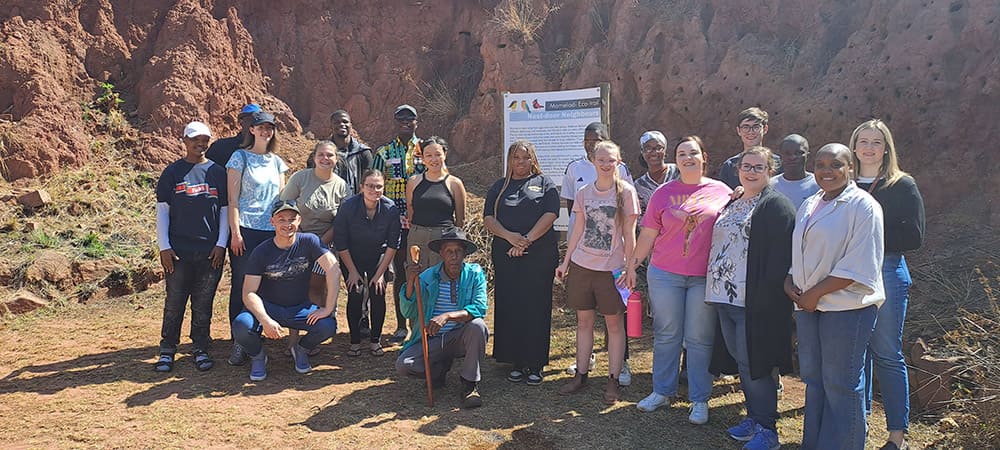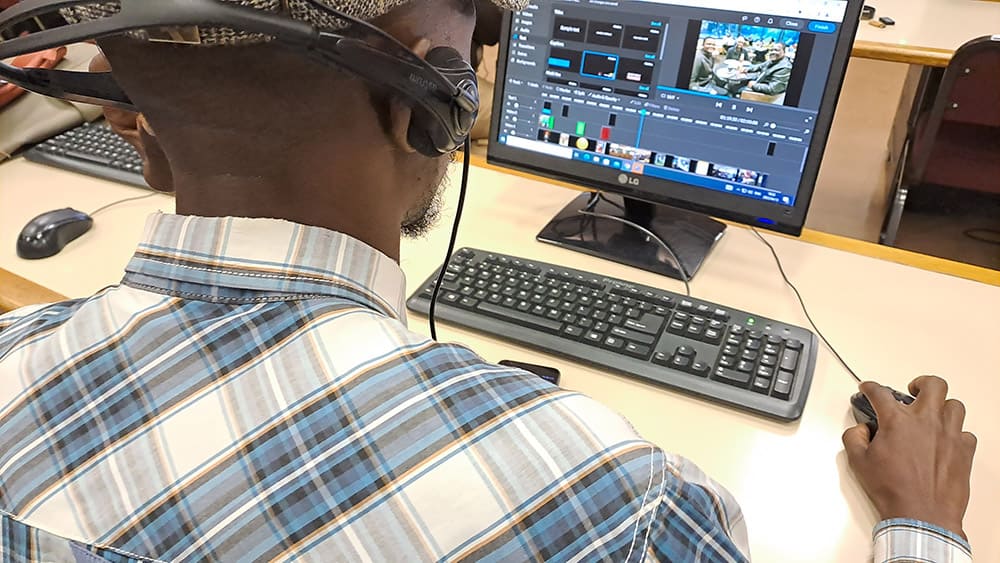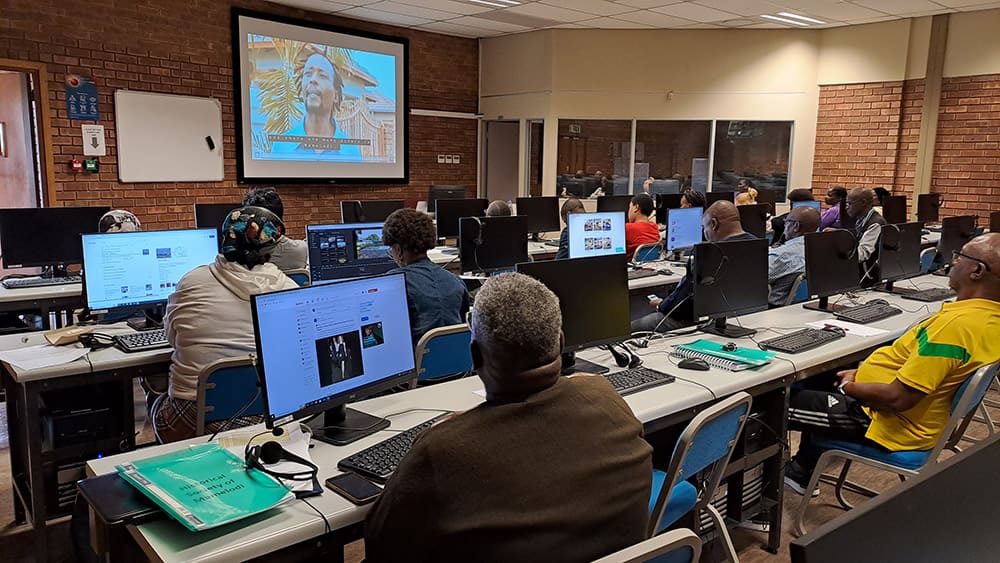A local-community effort to digitally capture Mamelodi's history has received a shot in the arm from the University of Pretoria's (UP's) Mamelodi Campus and its Department of Historical and Heritage Studies. Reverend Chris Nkomo and other Mamelodi residents founded the Historical Society of Mamelodi to help preserve the area's rich heritage. "Each story has its own weight," says Rev Nkomo, who is the Society Chair. "Our children must know how we came to be here." Mamelodi ("mother of melodies") was established as a blacks-only area about 27 km northeast of Pretoria in the early 1950s, through South Africa's Group Areas Act. In 1960 black citizens were removed from the suburbs of Pretoria and relocated to Mamelodi. UP's involvement in the project to capture Mamelodi's history began after Rev Nkomo completed its Starting and Sustaining Community Projects course in 2018. He also completed UP's Leadership in Urban Transformation course in 2023.
He says the initial plan was to compile a book containing stories, photographs and other information from Mamelodi's past. The idea to create a digital, easily accessible online archive was born when he met Dr Martina Jordaan, Head of Community Engagement and Postgraduate Studies at UP's Mamelodi Campus, in 2022. She was at the time starting to work with ArcGIS StoryMaps software, which allows users to create interactive maps using visuals and text. Dr Jordaan hosted a series of workshops during 2022 and 2023 at the Mamelodi Campus' computer labs to boost Society members' digital literacy skills. Many have since learnt how to use ArcGIS StoryMap software, video equipment, and cloud-based WeVideo editing tools, among other skills.
"I am impressed by their tenacity in learning new skills, and in using those towards a worthy cause, despite some members being over 70 years old," Dr Jordaan says. "Mr Mathibela, a retired principal who is 74 years old, is for instance working on a StoryMap of Mr Selaelo Walter Seboni, an educationist who had a huge impact in the local community."
The Society's website, YouTube channel and LinkedIn profile were launched in June 2023, spearheaded by Dr Jordaan, Rev Nkomo, Mr Mfana Mathibela, Mr Obed Mahlangu and Mr Moses Mokele. Members are also working towards compiling stories for an e-book. Together with a StoryMap about Mr Seboni, there are already others about Rev Nkomo and late uMkhonto we Sizwe member Jefferey Lucas Mgidi. Another features artists and musicians working in Mamelodi.

Local environmental and heritage champion and traditional healer, Dr Ephraim Mabena (Center front) with the Heritage and Cultural Tourism cohort
Training workshops
Rev Nkomo and other Society members were on hand during the July 2024 school holidays when Dr Jordaan provided training to another small group of community members at the Mamelodi Campus computer centre. Workshops for high school learners are also being planned for the September and December holidays. Similar workshops have already led to the uploading of contributions on topics such as Bacardi Music, a genre of South African music; food; the history of Mamelodi's historic Rondavels; and local issues such as dumping, substandard toilets and water problems. The workshops are all funded through a Talloires Network Engaged Research Grant, which aims to "amplify the voices of engaged researchers around the world".
"Community members said the training was valuable, as it enabled them to share their stories, while learners found the experience enriching and educational," Dr Jordaan says. "It is very satisfying to see how the use of University infrastructure and skills has played a valuable role in helping to create an easily accessible digital record of Mamelodi's past."
Student training
The digital archive project has in turn helped UP to provide a valuable practical "training ground" in community-based heritage tourism for students completing its Honours in Heritage and Cultural Tourism degree. Since 2022, the StoryMap project has formed part of a second-semester honours module that involves research on how to market and manage heritage sites with tourism potential. Members of the Historical Society of Mamelodi are on hand to mentor and guide students, and are involved in assessing the StoryMaps the 15 enrolled students complete.
"UP is one of two South African universities offering this multi-, inter- and cross-disciplinary degree programme," says Mr Hannes Engelbrecht, a lecturer in Heritage and Cultural Tourism in UP's Department of Historical and Heritage Studies. "It is about the business of tourism, and instils various employable skills in students. Being involved in the Mamelodi project teaches them to fully understand the natural and historic context of a tourism venture, while being cognisant of community empowerment, consent and dissonant heritage... This approach also produces an often-neglected competency that is part of greater human development: civic responsibility." The Mamelodi digital storytelling project features in the newly published academic book Museum Studies for a Post-Pandemic World, in a chapter titled ‘Mapping Memories and Making Meaning: Community-Engaged Heritage Studies and Research'. It was also included as a case study in the recent SUCSESS PROJECT Handbook comprising three conference papers. For each of these, Rev Nkomo, Dr Jordaan and Mr Engelbrecht were listed as co-presenters.
|

|
 |
Community member learning how to use WeVideo software. WeVideo training with the community members.
Stories provide sense of purpose
Rev Nkomo's journey to archiving Mamelodi's history began a few years before his UP studies: in 2015, he helped with an exhibition commemorating the 21 November 1985 Mamelodi massacre, in which 13 residents were killed by the police. He still remembers the impact of his interviews with some of the victims' family members: "The process did not only provide healing to those being interviewed, but also to the interviewer. It was welcomed by the families involved, because many did not know the details of what had happened," he says. "We learnt many beautiful things in the process, but also very horrible ones. It was emotional yet therapeutic to talk about the often bottled-up memories of the past." His own history in service of the people of Mamelodi was captured in a StoryMAP produced by Dr Jordaan. He says the process triggered very strong emotions and memories, but it was a valuable experience.
"I am retired, but not tired. Being involved in the Historical Society of Mamelodi has given me a purpose for how I spend my golden years. Mamelodi's history must be preserved, to the benefit of future generations."
Get Social With Us
Download the UP Mobile App